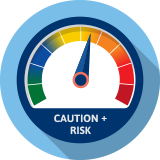December 12, 2018
L&S Risk Pulse™ Score

Caution +
The composite economic picture is mixed or unclear, indicating confusion in global markets. Valuations are questionable and volatility must be monitored.
L&S Risk Pulse™ Insights – “Tariff-Man To The Rescue”
General Comments
Markets have struggled with several problems this year, including the potential for slower growth where more and more evidence suggests that slower growth is in fact happening. This is not just a meme of fearful portfolio managers. More and more countries are showing troubling signs with Canada, Germany, Italy, Japan, and Saudi Arabia all reporting negative quarterly GDP growth in the most recent data releases.
Markets have also been spooked by actions of the Federal Reserve. Promises to continue to raise interest rates in October were likely one of the reasons why markets struggled over the past several weeks. Why, investors pondered, if growth was slowing was the Fed hellbent on raising interest rates? Do they not see what is happening around the globe? In addition to raising interest rates, the Fed continues to let their vast holding of bonds slowly decline as existing bonds mature. The Fed had been replacing those bonds with new purchases, but now they are letting their balance sheet shrink. This is yet another way the Fed is tightening policy at a time when many investors see those actions as increasing the odds that the Fed is making a policy mistake.
Investors have been worried about an inverted yield curve, a situation where short-term interest rates are higher than longer-term rates. This is a clear indicator of a policy mistake and has historically been a good tool to forecast a recession on the horizon. In early December, the yield on the 5-year Treasury bond dipped below the yield on the 3-year bond. “The yield curve is inverting – the sky is falling” claimed many screaming heads on television. The attached picture of the U.S. Treasury interest rate curve hardly shows a pattern of short-term rates above long-term rates, yet that did not stop prognosticators from creating fear and causing additional selling pressure.
We are watching interest rates very carefully, and we are nervous as the curve has flattened, something that must happen before it can invert. Still, it is important to remember two facts: First, 5 year rates below 3 year rates is not what is meant by an inverted yield curve; and second, the day to sell stocks is not the day the curve inverts but is potentially many months later. Stock markets typically run for several months or quarters before a recession becomes more likely, and stock prices begin to struggle.
The last big worry for the market has been the tariffs and a potential trade war with our global trade partners. This is where Tariff-Man came to the rescue. In a most predictable way, the President indicated that he had a very good meeting with Chinese Premiere Xi, and the two nations were calling a truce for 90 days to provide an opportunity to negotiate an end to the current trade disputes. We felt that the probability of some kind of positive announcement was likely, although cynicism suggested that good news would not be long lived.
Sure enough, the President did not disappoint. He dubbed himself “Tariff-Man,” and suggested the United States was getting rich collecting tariffs on Chinese and other imported goods. Despite his protestations, budget deficits are near record levels, even as the economy has been cruising along at one of the best rates of growth since the end of the Great Recession. Further, the people who are paying higher prices are American citizens, those same individuals who elected Mr. Trump to the highest office in the land. According to the Omaha World-Herald, Trump’s trade policy is putting a heavy burden on farmers in Nebraska. That newspaper’s estimate for the per capita cost of retaliatory tariffs for every Nebraskan is running at $632 in 2018. Thank you, Tariff-Man.
Later in the first week of December, the U.S. asked the Canadians to arrest the CFO of a leading Chines mobile phone company. It is not very politically savvy to arrest a Chinese executive when you have agreed to a cease fire.
Could it be that the market that was so enamored with Trump for the first two years of his incumbency has finally tired of his antics? There are reports that the Mueller investigation is winding down and that potentially means more indictments are on the horizon. There is a lawsuit progressing in Maryland arguing that the President has violated the emoluments clause of the Constitution (a clause that prohibits a president from profiting from his position). Has confidence in Mr. Trump finally started to crumble? It is entirely possible that the uncertainty created by unsound policies is finally having a negative impact on the stock market.
Conclusion
November was another difficult month, and the prospects for a Christmas rally seem to be fading as the belligerence of Tariff-Man is unsettling the market. Growth is clearly slowing, particularly overseas, and U.S. growth estimates are also coming down. We do not see the U.S. falling into a recession any time soon, and we do not see systemic credit problems that caused enormous pain in 2008.
Any decrease in trade tensions and political risks would be welcome to a market where prices have fallen, while earnings estimates have not declined materially. So far, that has not happened, but there is always tomorrow.
